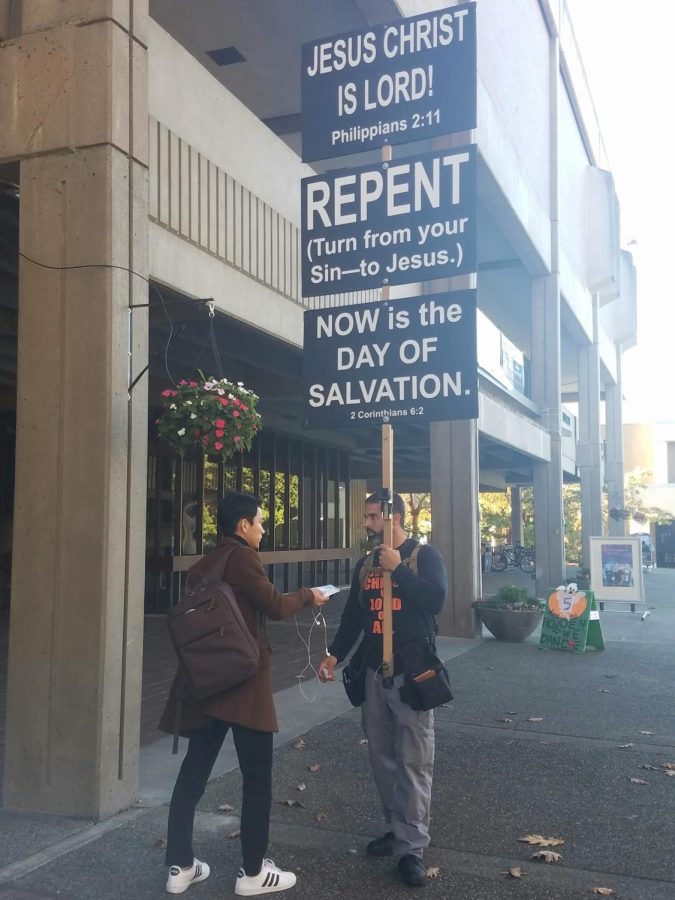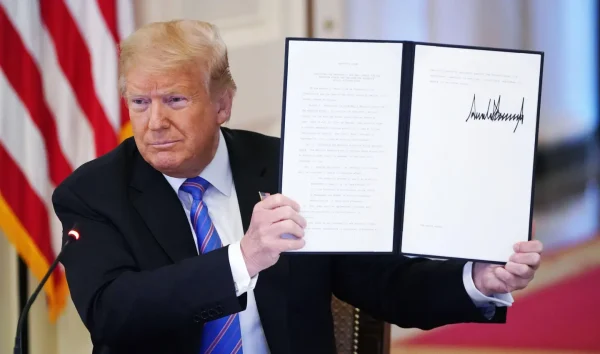EdCC adopts first-amendment rights policies
Picketeer Ron speaks with student David Lee in the EdCC courtyard in front of Snohomish Hall.
As a national conversation ensues on freedom of speech and citizen rights, EdCC has followed in the footsteps of other colleges in adopting policies and practices for first-amendment activities on campus.
On November 14, the EdCC Board of Trustees passed a policy titled “Use of College Facilities for First Amendment Activities,” which is expected to go into effect January 1 of the new year.
Policy WAC 132Y-136 includes multiple new regulations, including a ban on camping overnight on campus, as well as a protocol for encouraging non-student groups to notify student services and security of their presence on campus.
“Before engaging in First Amendment activities, all non-college groups are encouraged to provide notice to and register with campus safety and security no later than forty-eight hours prior to the activity of the non-college group’s presence on campus and to acknowledge receipt of these rules and to ensure that there are no scheduling conflicts,” states the policy. “The notice does not involve any application or approval process, and therefore, the ability to use designated public forum areas will not be denied unless they are already reserved for use by another group.”
According to Christina Castorena, Vice President of Student Services and the co-sponsor of the proposal along with Kevin McKay (Vice President of Finances and Operations), the policies are aimed at protecting first-amendment rights to the college’s public forum spaces, while also ensuring the safety of student and non-student groups alike.
“One of the things that we have been doing over the last couple years as a leadership cabinet is we’ve been looking at all of our policies and procedures and making sure that they’re all up to date,” Castorena explained in an interview. “Are there some that we need to update? Are there some that are no longer- that we need to rescind, because they’re no longer applicable? And then, where do we not have policies in place where we should?”
Castorena noted that many colleges are being prompted to have better policies in place for free speech events on campuses as a rising tide of social tension and political action permeates the American conscious.
As Vice President of student services, Castorena meets once a quarter with the other VP’s of student services across 34 community and technical colleges in the area to discuss policies which promote student learning, safety, and opportunities.
Recently, she says, conversations have taken place regarding policies around the use of college facilities for the use of free speech.
“So myself and Kevin McKay, the VP of finance and operations, then looked at what are some of the models out there and started the process of putting one together with stakeholders on campus over the course of several months, and then began a process for it to become policy.”
Students at EdCC are familiar with everything from religious picketing to vegan pamphlet campaigns in the courtyard. While many students have their own personal stories of memorable or uncomfortable interactions with the variation of non-student groups on campus, Castorena noted, “It wasn’t necessarily based on any incident or incidents that we had. It was more of, what’s a conversation that’s happening in higher education, around the country?”
However, the proposal was largely a standard document pre-made in cooperation with other colleges and their experiences. “The policy itself was a model policy developed by the Washington state community technical colleges attorney, so they had already established it as a model,” Castorena said. “They said, okay, we’ve vetted it through our AV process, so here’s what you can and you can’t do.”
Castorena noted that the camping restrictions in the proposal, for example, were developed in part due to an unspecified event at Seattle Central Community College, in which a group camped out for weeks on campus.
“It became a public safety issue, because of trash and bodily fluids and things like that that were there. And so when the system AG’s wrote the model they included that in there. It seemed to be a reasonable thing to include, and so we kept that in there.”
For this reason, the use of facilities section notes that between the hours of 9:00 pm to 7:00 am, camping is prohibited. “Camping” in the policy is defined by “sleeping, cooking activities, or storing personal belongings for personal habitation, or the erection of tents or other shelters or structures used for purposes of personal habitation.”
The policy also specifies that first amendment practices must take place between the hours of 7:00 am and 5:00 pm, and for no longer than five hours from beginning to end.
David Breed, President of the faculty senate, noted that there had been concerns from the senate regarding the process by which the policy was being drafted. “This concern is not unique to the policy on campus free speech and assembly, but to other issues as well, in that often the faculty are presented with a final version of a policy that we had little to no voice in crafting and we are asked to ratify that policy without much chance to influence it.”
The faculty senate at EdCC functions as a governance structure as well as a voice of the faculty on non-contractual matters (which are handled by the union) relating to instruction. In the past, the senate council- currently comprised of Breed as well as 12 others- have impacted the development and coordination of initiatives such as the “Guided Pathways” initiative of 2015-16. These policies implemented new funding to redevelop programs of study, advising models, and communication tools for the college.
However, as Breed notes, how much impact the faculty senate is afforded in decision-making processes at the college remains murky, such as in the development of the first-amendment policy.
Castorena addressed these concerns: “The faculty were not at the table with the drafting of the policy, but when the policy was drafted, we took it to faculty senate. And that was me- I took it to faculty senate and presented it to them and said, here’s why we’re doing, and here’s what it says. I even gave it to them in a google document so that they could put their questions/comments/concerns, and many faculty did,” Castorena assured. “So, although they were not at the table when it was developed, they certainly were involved in the process.”
Breed corroborated that the senate council had been involved, dating back to Winter and Spring quarter of early 2017. “With the draft policy written and vetted by attorneys before it came to the senate council, we did not feel we had an opportunity to add much or challenge the content of the policy,” he expressed. “If the policy had been objectionable, the senate council would have raised our voices at the time, but we generally agreed with the intent. The intent appears to be to ensure that EdCC remains an open campus to members of the community but that we also maintain a safe and healthy learning environment for our students.”
However, the concern over the participatory influence afforded to the faculty senate remains. “Our concerns then were less about the specifics of the proposed policy and more about the timing and degree to which the senate is involved. We would like to be included earlier in the process, at the design stage, rather than at the end when EdCC policies are largely set,” Breed says. “This is symptomatic of a larger concern the faculty have voiced since our senate began in fall of 2015: to what extent is the senate a part of the college’s decision-making process?
“This question remains ambiguous, but the members of the faculty senate are hoping to renew this conversation and partner with the EdCC administration in crafting a new, more participatory governance model that specifically states where the senate fits into our college’s leadership structure.”
As Jean Hernandez steps down as President of EdCC on December 31, Castorena will be stepping up as interim President. She seemed confident and excited about having passed this policy, designating a lengthy portion of the interview to express the need for policies ensuring student safety while retaining rights.
“First and foremost, we wanna make sure people are safe when they’re on campus, and so creating a policy then allows us to be reasonable about, y’know, we’re not at all wanting to deny access, that’s not what this policy is about. This policy is about: people are coming, let’s be reasonable and set a time, place, and manner- a parameter around those activities on campus, so that we can maintain safety and security for everybody, whether it’s our students or whether it’s a group that’s on campus. Because we want to ensure everybody’s safe.”






